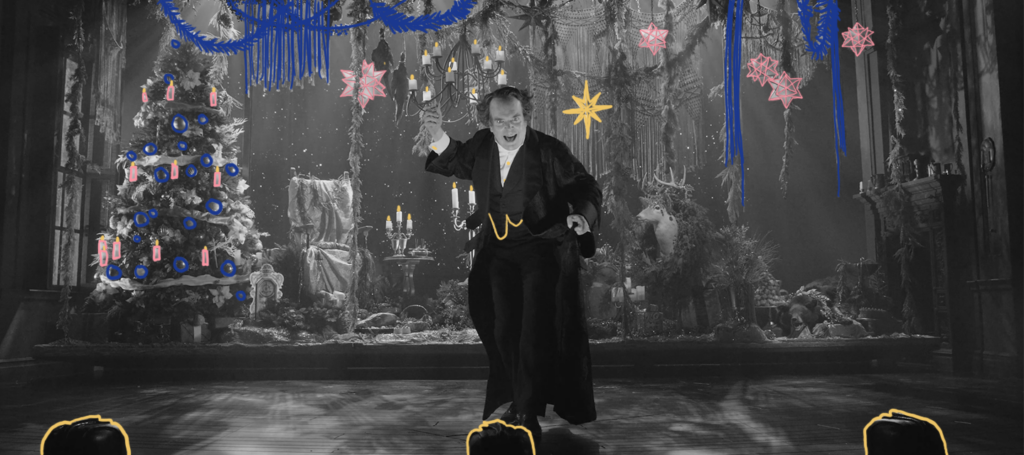


In ‘A Christmas Carol,’ a Classic Tale Made to Feel Anew
“Marley is dead.” Everybody knows that.
So it’s spoken, most assuredly, that first line of that familiar story. Starting with a match lit in the dark, a whole world starts to unravel around the sole performer who, with every small shift in his posture, and in the timbre of his voice, will embody almost every character in this beloved tale, including a potato who’s eager to be peeled at the dinner table.
The spirit of Christmas must be saved. Will be saved – everybody knows that too.
Because there’s hope for old Ebenezer Scrooge yet.
Having seen countless theater/film/TV/radio adaptations of A Christmas Carol (one dare not imagine how many there have been since Dickens first wrote it), I often look at its revivals through skeptical eyes: Why now? Why again? Is it enough to simply consider it a “holiday show” or is there additional relevance or intrigue?
In this particular revival, Jefferson Mays fronts a unique, one-man, tour-de-force version, which he’s also co-adapted with director Michael Arden, and Susan Lyons. It takes an extraordinary amount of commanding presence to enthrall an audience as large as a Broadway house, to captivate theatergoers who have grown accustomed to modern stagecraft, with a tale that’s been told time and again.
The larger-than-life Mays, who made a lasting impression with A Gentleman’s Guide to Love and Murder previously, is certainly equipped with charisma enough to shed new light on Scrooge’s midlife crisis. And indeed, I was able to hear the story anew, through Mays’ energetic tones as the narrator and chameleonic portrayals of every character in the story from Tiny Tim to old Marley’s ghost. In the story, it’s this apparition who shows up to warn his Christmas-hating old friend about the forthcoming visit from a trio of specters representing the past, present, and future of Scrooge’s Christmas. Leading the solitary old man through a series of scenes from his own life, consequently affecting a fundamental change in his attitude towards the holiday, and thus his way of life.
Through Mays, there’s a willingness for change from a much more sympathetic Scrooge, a character whose name has often been used as a synonym for selfishness, a man who holds onto his rigid ways to navigate the world. Never appearing without purpose, Mays seems to occupy every inch of the performance space and populates the place as an ensemble consisting of himself. In contrast to the narrator’s engaging presence, for instance, was Scrooge’s palpable loneliness, which made me take pause and contemplate it with a new understanding.
Mays’ poignant performance; however, was somewhat marred by an excess of effects. The vocal augmentation put on the actor’s voice often made it difficult to make out the words he was saying. The video projections that indicate some of the background characters in Scrooge’s past, also felt unnecessary, if not distracting. There were also moments when I found it hard to concentrate on the narrative because of the overwhelming sensory experiences. In short, the production would’ve been more compelling had it favored simplicity rather than over-illustrating the storytelling with bells and whistles.
Christmas has always been strange; it’s a time of warm reunion, for those with means; it’s also a time of heightened isolation, for those disenfranchised, or without a home, or familial safety nets. And in a time when isolation has affected all of us in ways more strenuous than ever before, I was able to hear the pathos in Scrooge’s emotional journey as he confronts the sorrows in his past, empathize with him as he grapples with his fears of disappearing – or following his dead ex-business-partner Marley’s footstep, who, in life had no friends besides Scrooge, nor any other mourner in death.
As an expat living far from home, I can relate to the feeling of distance from the rest of society, having spent many holidays alone, when holidays are meant for families – and I can’t help but wonder, what turns a man’s heart to stone? Scrooge follows a specter back in time and remembers his father’s neglect – and I question the viability of untangling cruelty that’s inherited through unchecked emotional trauma.
Scrooge is a changed man at the end of the story – he’s rediscovered the spirit of Christmas within himself. And I suppose it’s a question that should be on everyone’s mind. Indeed, what exactly is the spirit of Christmas? On a holiday where joy is multiplied by sharing it with others, it’s good to be reminded to be kind, and open – no one should be alone, truly. But everybody knows that too, right?
Keep Reading

‘& Juliet’ Serves Pure Pop Scrumptiousness
Imagine a musical that uses the hottest pop-bops from your tween years to rewrite Shakespeare’s Romeo and Juliet as redesigned by Anne Hathaway. No, not the Anne who won an Oscar for Les Mis―the other one, who has an ax to grind with her playwright hubby Will who’s never at home and seems allergic to […]
Read More
The Hilarious, Life-Affirming ‘The Old Man and the Pool’ Turned Me into a Mike Birbiglia Fan
When comic Mike Birbiglia took to the almost bare stage of the Vivian Beaumont Theatre I noticed that besides a dark stool, a staple for stand-up comics, there wasn’t much else to see (a stark contrast from the filled-to-the-brim lavish set of The Skin of Our Teeth last time I was here). I wasn’t expecting […]
Read More












